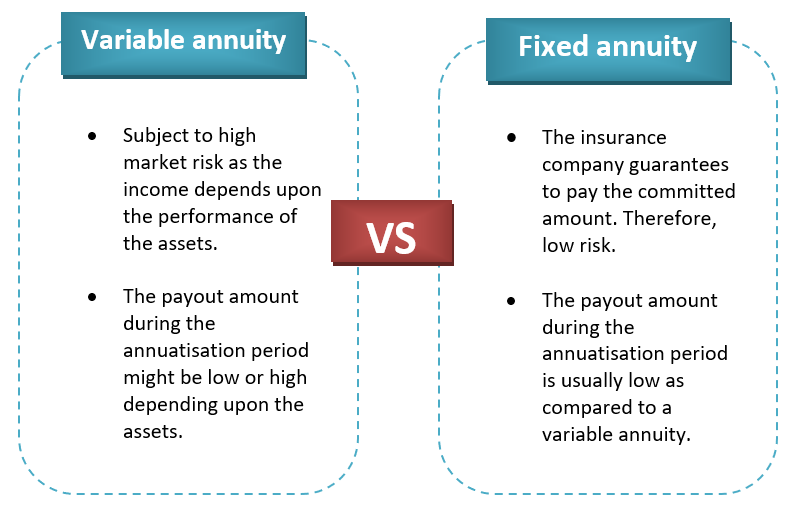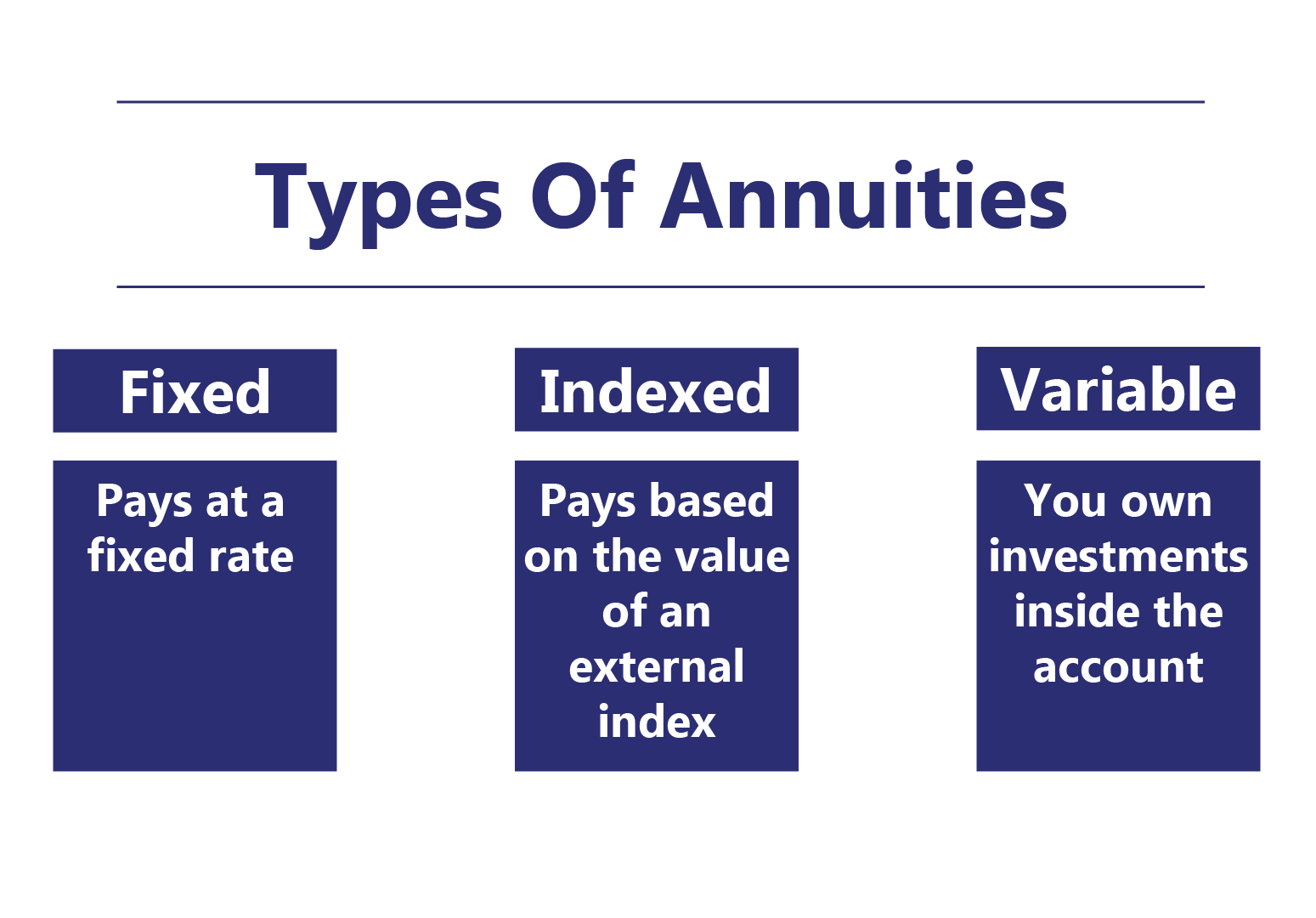All Categories
Featured
Table of Contents
There are 3 types of annuities: repaired, variable and indexed. With a dealt with annuity, the insurance business guarantees both the rate of return (the passion price) and the payment to the investor.
With a deferred fixed annuity, the insurer accepts pay you no less than a specified interest rate as your account is growing. With an immediate fixed annuityor when you "annuitize" your postponed annuityyou get an established set quantity of money, normally on a regular monthly basis (similar to a pension).
While a variable annuity has the advantage of tax-deferred development, its annual expenses are likely to be a lot more than the costs of a common mutual fund. And, unlike a taken care of annuity, variable annuities do not supply any type of warranty that you'll earn a return on your financial investment. Instead, there's a risk that you might really shed money.
Understanding Financial Strategies Everything You Need to Know About Variable Annuity Vs Fixed Annuity Breaking Down the Basics of Investment Plans Pros and Cons of Annuities Fixed Vs Variable Why Variable Annuity Vs Fixed Annuity Can Impact Your Future Fixed Income Annuity Vs Variable Annuity: Simplified Key Differences Between Deferred Annuity Vs Variable Annuity Understanding the Risks of Pros And Cons Of Fixed Annuity And Variable Annuity Who Should Consider Strategic Financial Planning? Tips for Choosing the Best Investment Strategy FAQs About What Is A Variable Annuity Vs A Fixed Annuity Common Mistakes to Avoid When Planning Your Retirement Financial Planning Simplified: Understanding Fixed Annuity Vs Equity-linked Variable Annuity A Beginner’s Guide to Variable Vs Fixed Annuities A Closer Look at How to Build a Retirement Plan
As a result of the complexity of variable annuities, they're a leading source of investor complaints to FINRA. Prior to acquiring a variable annuity, very carefully checked out the annuity's prospectus, and ask the individual offering the annuity to describe all of the product's attributes, motorcyclists, costs and limitations. You need to also know how your broker is being compensated, consisting of whether they're getting a compensation and, if so, just how much.
Indexed annuities are complex economic instruments that have attributes of both dealt with and variable annuities. Indexed annuities commonly supply a minimal surefire passion price incorporated with a rate of interest linked to a market index. Lots of indexed annuities are tied to broad, popular indexes like the S&P 500 Index. Some use various other indexes, consisting of those that stand for other sections of the market.
Comprehending the functions of an indexed annuity can be complex. There are numerous indexing approaches firms use to compute gains and, because of the variety and intricacy of the methods utilized to debt interest, it's tough to compare one indexed annuity to an additional. Indexed annuities are generally categorized as one of the adhering to 2 kinds: EIAs offer an assured minimum rates of interest (usually at the very least 87.5 percent of the premium paid at 1 to 3 percent rate of interest), as well as an added rates of interest linked to the performance of several market index.

Conventional investors who value safety and stability. Those nearing retirement that intend to shelter their possessions from the volatility of the stock or bond market. With variable annuities, you can spend in a range of safeties consisting of stock and bond funds. Securities market efficiency establishes the annuity's value and the return you will obtain from the cash you invest.
Comfortable with changes in the stock exchange and want your financial investments to equal rising cost of living over a lengthy duration of time. Youthful and wish to prepare financially for retirement by enjoying the gains in the supply or bond market over the long-term.
As you're building up your retired life cost savings, there are numerous means to stretch your money. can be specifically helpful financial savings tools due to the fact that they ensure an earnings quantity for either a set period of time or for the remainder of your life. Dealt with and variable annuities are 2 choices that use tax-deferred development on your contributionsthough they do it in various ways.
Exploring the Basics of Retirement Options A Comprehensive Guide to What Is A Variable Annuity Vs A Fixed Annuity What Is the Best Retirement Option? Benefits of What Is A Variable Annuity Vs A Fixed Annuity Why Variable Vs Fixed Annuity Matters for Retirement Planning Annuities Fixed Vs Variable: Simplified Key Differences Between Different Financial Strategies Understanding the Risks of Variable Vs Fixed Annuity Who Should Consider Strategic Financial Planning? Tips for Choosing Fixed Annuity Vs Equity-linked Variable Annuity FAQs About Annuities Variable Vs Fixed Common Mistakes to Avoid When Choosing a Financial Strategy Financial Planning Simplified: Understanding Your Options A Beginner’s Guide to Indexed Annuity Vs Fixed Annuity A Closer Look at Fixed Interest Annuity Vs Variable Investment Annuity
variable annuity or both as you plot out your retirement revenue plan. A supplies a guaranteed rate of interest. It's taken into consideration a traditional item, providing a modest revenues that are not tied to market performance. Your agreement worth will certainly raise as a result of the amassing of ensured interest earnings, implying it won't decline if the market experiences losses.
An includes spent in the stock exchange. Your variable annuity's investment efficiency will certainly impact the dimension of your nest egg. It may assure you'll obtain a series of payments that begin when you retire and can last the remainder of your life, supplied you annuitize (begin taking settlements). When you start taking annuity repayments, they will rely on the annuity value at that time.
Market losses likely will result in smaller sized payouts. Any passion or other gains in either sort of agreement are sheltered from current-year tax; your tax responsibility will certainly come when withdrawals begin. Let's take a look at the core functions of these annuities so you can decide how one or both may fit with your general retired life technique.

A set annuity's value will not decrease as a result of market lossesit's regular and stable. On the other hand, variable annuity values will certainly rise and fall with the performance of the subaccounts you choose as the markets fluctuate. Profits on your fixed annuity will very depend upon its contracted rate when acquired.
On the other hand, payout on a dealt with annuity purchased when rates of interest are reduced are more probable to pay incomes at a reduced rate. If the rate of interest is guaranteed for the size of the contract, earnings will certainly continue to be consistent despite the marketplaces or rate activity. A fixed rate does not imply that repaired annuities are risk-free.
While you can't come down on a fixed price with a variable annuity, you can pick to purchase conventional or aggressive funds tailored to your threat degree. Much more conservative investment options, such as short-term mutual fund, can help in reducing volatility in your account. Given that dealt with annuities provide a set price, dependent upon current rates of interest, they don't provide that very same versatility.
Analyzing Strategic Retirement Planning A Comprehensive Guide to Variable Annuity Vs Fixed Annuity Breaking Down the Basics of Investment Plans Advantages and Disadvantages of Different Retirement Plans Why Fixed Annuity Vs Equity-linked Variable Annuity Can Impact Your Future Variable Annuities Vs Fixed Annuities: How It Works Key Differences Between Different Financial Strategies Understanding the Risks of Long-Term Investments Who Should Consider Fixed Vs Variable Annuities? Tips for Choosing the Best Investment Strategy FAQs About Planning Your Financial Future Common Mistakes to Avoid When Choosing a Financial Strategy Financial Planning Simplified: Understanding What Is Variable Annuity Vs Fixed Annuity A Beginner’s Guide to Smart Investment Decisions A Closer Look at Variable Vs Fixed Annuity

You possibly can make much more lengthy term by taking added risk with a variable annuity, but you might also lose money. While fixed annuity contracts stay clear of market threat, their trade-off is much less development possibility.
Investing your variable annuity in equity funds will provide even more potential for gains. The costs connected with variable annuities might be greater than for other annuities.
The insurance coverage business may enforce surrender fees, and the Internal revenue service may levy a very early withdrawal tax charge. They begin at a specific percent and then decline over time.
Annuity earnings undergo a 10% very early withdrawal tax charge if taken prior to you get to age 59 unless an exception uses. This is enforced by the IRS and relates to all annuities. Both taken care of and variable annuities give options for annuitizing your balance and turning it into an ensured stream of lifetime income.
Decoding Fixed Annuity Vs Variable Annuity A Closer Look at Variable Annuities Vs Fixed Annuities What Is Variable Vs Fixed Annuities? Advantages and Disadvantages of Different Retirement Plans Why Fixed Annuity Vs Variable Annuity Is Worth Considering How to Compare Different Investment Plans: Explained in Detail Key Differences Between Fixed Income Annuity Vs Variable Growth Annuity Understanding the Risks of Long-Term Investments Who Should Consider Strategic Financial Planning? Tips for Choosing the Best Investment Strategy FAQs About Variable Annuities Vs Fixed Annuities Common Mistakes to Avoid When Choosing Choosing Between Fixed Annuity And Variable Annuity Financial Planning Simplified: Understanding Fixed Indexed Annuity Vs Market-variable Annuity A Beginner’s Guide to Annuity Fixed Vs Variable A Closer Look at Variable Vs Fixed Annuities
You may make a decision to use both taken care of and variable annuities. However if you're choosing one over the various other, the differences matter: A may be a much better choice than a variable annuity if you have an extra conservative threat resistance and you look for foreseeable passion and primary protection. A might be a far better alternative if you have a higher threat resistance and desire the capacity for lasting market-based growth.
There are various kinds of annuities that are made to serve various purposes. A set annuity warranties payment of a set amount for the term of the arrangement.
A variable annuity fluctuates based on the returns on the shared funds it is invested in. An instant annuity starts paying out as quickly as the purchaser makes a lump-sum settlement to the insurance company.
An annuity that gives guaranteed earnings forever (or past, for your beneficiary) Assures you that also if you diminish their various other properties, you will certainly still have some revenue coming in. Annuities' returns can be either dealt with or variable. Each kind has its pros and disadvantages. With a repaired annuity, the insurer guarantees the purchaser a specific repayment at some future date.
Table of Contents
Latest Posts
Breaking Down Your Investment Choices A Closer Look at How Retirement Planning Works Defining the Right Financial Strategy Features of Variable Annuity Vs Fixed Annuity Why Deferred Annuity Vs Variabl
Decoding Tax Benefits Of Fixed Vs Variable Annuities Everything You Need to Know About Fixed Income Annuity Vs Variable Annuity What Is the Best Retirement Option? Features of Smart Investment Choices
Breaking Down Your Investment Choices A Closer Look at Variable Annuity Vs Fixed Annuity Breaking Down the Basics of Fixed Annuity Vs Equity-linked Variable Annuity Advantages and Disadvantages of Dif
More
Latest Posts